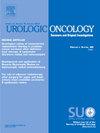累积吸烟暴露影响上尿路上皮癌的肿瘤预后。
IF 2.4
3区 医学
Q3 ONCOLOGY
Urologic Oncology-seminars and Original Investigations
Pub Date : 2025-05-01
DOI:10.1016/j.urolonc.2025.01.018
引用次数: 0
摘要
背景:累积吸烟暴露(CSE)对上尿路上皮癌(UTUC)肿瘤预后的影响仍未得到充分研究。我们利用当代大型多中心、多国队列研究了这一因素对接受根治性肾输尿管切除术的UTUC患者肿瘤预后的影响。方法:对17个机构的1730例患者进行多中心综述。共有1041例患者符合选择标准:肾输尿管切除术治疗尿路上皮癌,没有变异组织学和完整的病理和吸烟资料。根据先前的研究,吸烟暴露程度按每天吸烟数和吸烟年限划分为轻度、中度或重度。采用Kaplan-Meier和多变量风险模型评估癌症特异性(CSS)和总生存期(OS)。一项亚分析检查了戒烟对以CSE分层的生存的影响。结果:中位随访(IQR)为24(10-48)个月。轻度CSE等于吸烟中位数为2.0包年,中度CSE相当于13.0包年,重度CSE相当于40包年。不吸烟者的5年CSS和OS分别为97%和91%,轻度暴露组为96%和89%,中度暴露组为85%和66%,重度暴露组为75%和60%。在多变量危险模型中,与不吸烟者相比,中度和重度吸烟暴露与更差的CSS和OS相关。在中度或重度CSE患者中,戒烟与改善生存结果无关。结论:在UTUC队列中,CSE升高与总体健康和肿瘤预后恶化相关。戒烟可以调节癌症的结果,达到一定的吸烟暴露阈值,强调早期戒烟和持续积极治疗UTUC患者的必要性。本文章由计算机程序翻译,如有差异,请以英文原文为准。
Cumulative smoking exposure impacts oncologic outcomes of upper tract urothelial carcinoma
Background
The impact of cumulative smoking exposure (CSE) on oncologic outcomes for upper tract urothelial carcinoma (UTUC) remains understudied. We examined the effect of this factor on oncologic outcomes in UTUC patients undergoing radical nephroureterectomy utilizing a large contemporary multicenter, multinational cohort.
Methods
Multicenter review of 1,730 patients across 17 institutions. A total of 1,041 patients met selection criteria: nephroureterectomy for urothelial carcinoma without variant histology and complete pathologic and smoking data. Smoking exposure was stratified as light, moderate, or heavy by cigarettes per day and years smoking based on prior studies. Cancer-specific (CSS) and overall survival (OS) were assessed using Kaplan–Meier and multivariable hazards models. A sub-analysis examined the effect of smoking cessation on survival stratified by CSE.
Results
Median follow-up (IQR) was 24 (10–48) months. Light CSE was equal to a median of 2.0 pack years smoked, moderate CSE was equivalent to 13.0 pack years, and heavy CSE was equivalent to 40 pack-years. Five-year CSS and OS were 97% and 91% in nonsmokers, 96% and 89% with light exposure, 85% and 66% with moderate exposure, and 75% and 60% with heavy exposure. On multivariable hazards models, both moderate and heavy smoking exposure were associated with worse CSS and OS compared to nonsmokers. Smoking cessation was not associated with improved survival outcomes among patients with moderate or heavy CSE.
Conclusions
Increasing CSE was associated with worse general health and oncologic outcomes in this UTUC cohort. Smoking cessation can modulate cancer outcomes up to certain thresholds of smoking exposure, emphasizing the need for both early smoking cessation and continued aggressive cancer treatment in patients with UTUC.
求助全文
通过发布文献求助,成功后即可免费获取论文全文。
去求助
来源期刊
CiteScore
4.80
自引率
3.70%
发文量
297
审稿时长
7.6 weeks
期刊介绍:
Urologic Oncology: Seminars and Original Investigations is the official journal of the Society of Urologic Oncology. The journal publishes practical, timely, and relevant clinical and basic science research articles which address any aspect of urologic oncology. Each issue comprises original research, news and topics, survey articles providing short commentaries on other important articles in the urologic oncology literature, and reviews including an in-depth Seminar examining a specific clinical dilemma. The journal periodically publishes supplement issues devoted to areas of current interest to the urologic oncology community. Articles published are of interest to researchers and the clinicians involved in the practice of urologic oncology including urologists, oncologists, and radiologists.

 求助内容:
求助内容: 应助结果提醒方式:
应助结果提醒方式:


